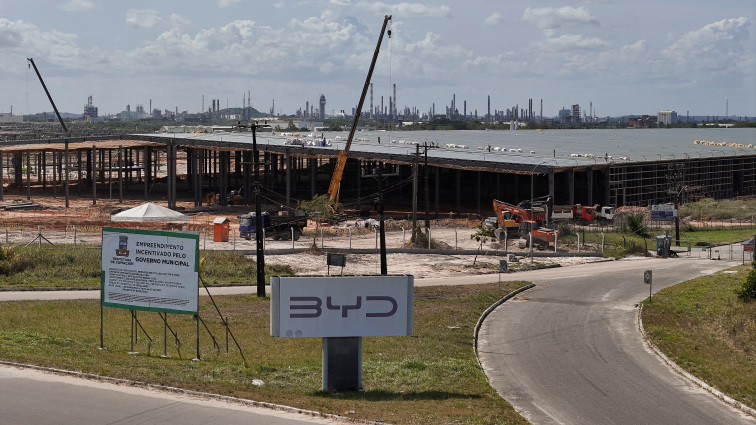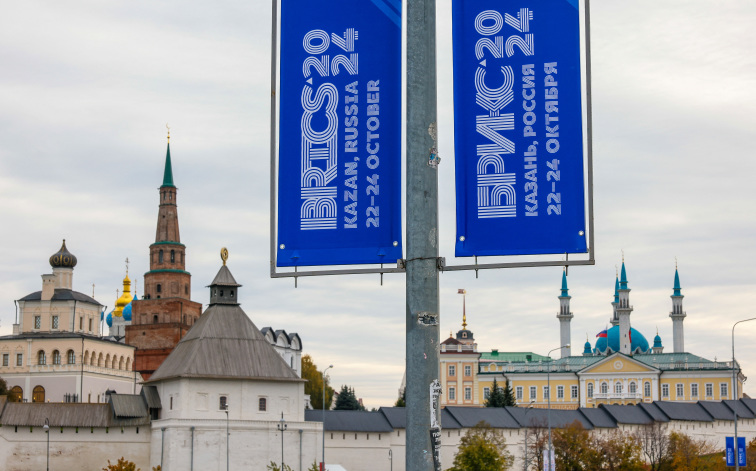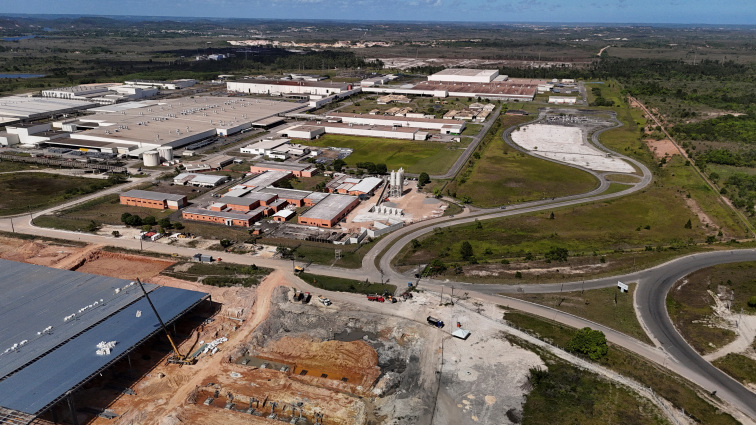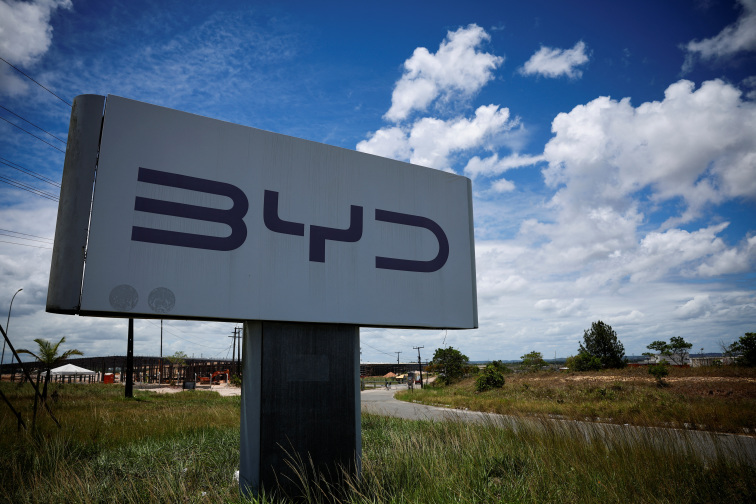Photo: The BYD logo on the wheel hub cover of a BYD electric vehicle. (Photo by Sean Gallup/Getty Images)
[People News] On Friday, January 31, Reuters published an exclusive report detailing labor abuses at BYD’s factory construction site in Brazil. Brazilian investigators discovered that the labor contracts signed between BYD’s construction contractor, Golden Architect Group, and Chinese workers contained clauses that openly violated both Brazilian and Chinese labor laws.
According to Voice of America, Reuters reported that Chinese workers sent to northeastern Brazil to build BYD’s new electric vehicle factory were paid approximately $70 for a 10-hour shift—more than double the minimum hourly wage in many parts of China. While signing up to work in Brazil was easy, leaving proved to be much harder.
Reuters journalists obtained a copy of a labor contract signed by Chinese workers recruited by Golden Architect Group, BYD’s contractor in Brazil. The contract required workers to surrender their passports to the company and agree to have most of their wages sent directly back to China. Additionally, workers had to pay a $900 deposit, which they could only reclaim after working in Brazil for six months.
Brazilian investigators and three Chinese labor law experts confirmed that 163 Chinese workers had signed this three-page document. Last month, Brazilian labor inspectors declared that these workers were subjected to "slave-like" working conditions.
Previously undisclosed contract clauses also granted Golden Architect Group unilateral authority to extend workers’ contracts by six months. The contract further imposed penalties of 200 RMB (about $28 USD) for actions such as arguing, swearing, or walking around the worksite or dormitory shirtless.
Experts: Contracts Contain Hallmarks of Forced Labor
Aaron Halegua, a lawyer and researcher at New York University School of Law, stated that many of the contract’s provisions "are textbook examples of forced labor red flags." Halegua previously served as legal counsel for Chinese workers in the U.S. Commonwealth of the Northern Mariana Islands, where employers were found guilty of forced labor, winning compensation for the workers.
Golden Architect Group, which recruits workers for BYD’s Brazil plant from cities including Changzhou, Yangzhou, and Hefei, denied the accusations. The company claimed that the findings of Brazilian labor inspectors were inaccurate and that some issues arose due to translation errors.
On December 2, BYD Brazil President Tyler Li met with Brazilian President Luiz Inácio Lula da Silva. Two sources familiar with the meeting revealed that Li assured Lula that BYD was addressing the issue.
Lula’s office did not immediately respond to Reuters’ request for comment.
Two weeks later, Brazilian labor inspectors conducted a surprise raid at the BYD construction site. They found that Chinese workers were living in overcrowded dormitories without mattresses—with 31 workers crammed into a single room with only one bathroom. Personal belongings and food were scattered on the floor. Inspectors described these conditions as "degrading to human dignity."
Tyler Li denied discussing the labor abuses with Lula and claimed that BYD was unaware of Golden Architect Group’s contract terms. He told Reuters that BYD "is taking action to ensure this situation does not happen again."
Matheus Viana, head of Brazil’s anti-slavery labor watchdog, stated that while no direct evidence showed BYD’s involvement in the violations, the company "bears direct responsibility" and must be held accountable for its contractor’s actions.
BYD’s Promise of Job Creation Ends in Disappointment
At the end of 2023, BYD agreed to take over an industrial park in Camaçari, near the capital of Bahia state, and invest heavily in electric vehicle production. This site was previously home to a Ford Motor Company factory, which had operated for 20 years.
Ford abandoned the factory in 2021, laying off approximately 5,000 workers and completely ending its operations in Brazil.
For Brazilian President Luiz Inácio Lula da Silva, a former leader of the São Paulo Metalworkers' Union, BYD’s agreement with the Brazilian government was seen as a promise to bring 21st-century manufacturing jobs to a city governed by the Workers' Party (PT).
BYD’s massive investment announcement raised hopes among local residents, who expected the Chinese automaker to create twice as many jobs as Ford had cut, in a state with an unemployment rate of 10%.
However, when BYD hired Chinese contractors to build the factory, Antonio Ubirajara Santos Souza, coordinator of the local construction workers’ union (Sindticcc), criticized the company’s approach as "unfair."
In a statement to Reuters, BYD claimed it was committed to creating local jobs and promised to hire 20,000 workers, including Brazilian employees, once the plant became fully operational.
However, during a December inspection raid, Brazilian officials discovered 10 copies of employment contracts containing clauses similar to those seen by Reuters. Some workers told investigators they had not received contracts, while others said they only signed contracts months after arriving in Brazil.
Daniel Santana, the labor inspector in charge of the case, stated that BYD and Golden Architect Group would be charged with obstructing the investigation because they failed to provide workers’ residential addresses as requested by inspectors. As a result, both Chinese companies could face fines.











News magazine bootstrap themes!
I like this themes, fast loading and look profesional
Thank you Carlos!
You're welcome!
Please support me with give positive rating!
Yes Sure!